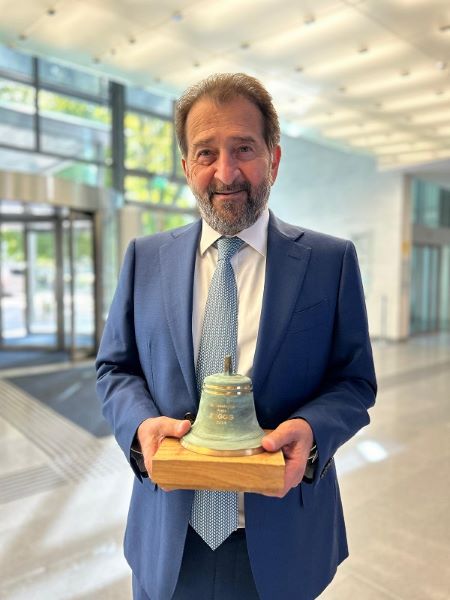King’s doctor: “A visionary, whose work has changed lives for the better”
27 September 2024 - Professor Kypros Nicolaides honoured with most prestigious Austrian medical award

Pioneering fetal medicine physician, Professor Kypros Nicolaides, has been awarded the Semmelweis prize for his contribution to obstetric care.
The groundbreaking doctor, who has worked at King’s College Hospital since 1980 and is one of the pioneers of fetal medicine, was presented with the award at the Austrian Society of Gynaecology and Obstetrics’ annual conference.
In the citation read out at the event, Professor Nicolaides was described as an outstanding and innovative gynaecologist who had made a significant contribution to women’s health.
Professor Christian Marth, Professor of the Department of Obstetrics and Gynaecology at Innsbruck Medical University in Austria said, “Today we celebrate and recognise the outstanding contribution of a truly remarkable individual, Professor Kypros Nicolaides. He is a visionary gynaecologist whose extensive work has profoundly influenced and expanded our understanding of fetal health, an area of vital importance to countless families around the globe.
“Throughout his professional journey, Professor Nicolaides has been at the forefront of groundbreaking advancement in pre-natal diagnosis. His exceptional contribution has not only transformed but has completely reshaped the landscape of obstetric care through his pioneering techniques and tireless dedication to improving the lives of others.”
Among his many achievements, Professor Nicolaides has researched and developed screening techniques in pregnancy, such as the fetal nuchal translucency test, which is conducted to help assess the risk of Down syndrome and other generic conditions in unborn babies. He has also developed techniques to screen for premature birth, which is the main cause of perinatal morbidity and mortality, and for pre-eclampsia, which left untreated can lead to serious complications for both mother and baby.
Professor Nicolaides is also at the forefront of innovation having pioneered surgical techniques on unborn babies to treat conditions such as twin-to-twin transfusion syndrome – a condition whereby one twin is getting more blood and nourishment than the other due to vessels in the placenta not being evenly dispensed – and diaphragmatic hernias – a rare condition where the diaphragm does not form completely during pregnancy, affecting development of the baby’s lungs. This was showcased in the 2020 Netflix documentary, The Surgeon’s Cut.
The award citation also referenced Professor Nicolaides’ passion for education and mentorship. “He firmly believes in the transformation, power and sharing knowledge and his unwavering commitment to training the next generation of medical professionals has left an indelible mark on countless students and practitioners worldwide,” Professor Marth added.
Professor Nicolaides has authored more than 1,500 peer-reviewed articles and more than 30 books. He has a H index (a metric that measures the productivity and citation impact of publications) of more than 200, which is the highest of any obstetrician and gynaecologist in the world. His research has been quoted and cited over 170,000 times.
Speaking of the award, Prof Nicolaides said, “It is a great honour to be awarded the Semmelweis prize.
“My life revolves around my work, and I will continue to push the boundaries of medicine to improve treatments for pregnant women and their unborn babies.”
The Semmelweis Prize is named after the Hungarian physician and scientist who was an early pioneer of antiseptic procedures. Semmelweis discovered that the incidence of often fatal bacterial infection following childbirth could be drastically reduced if healthcare workers in obstetrics disinfect their hands.
